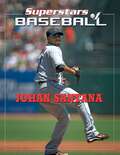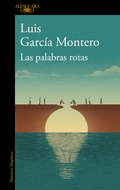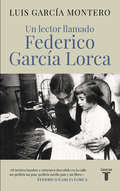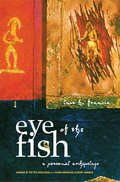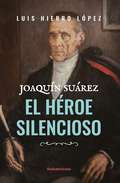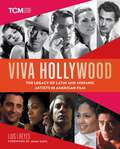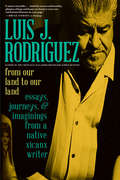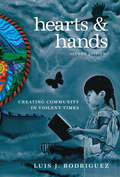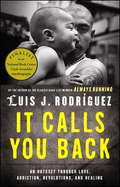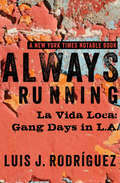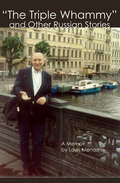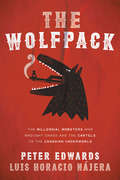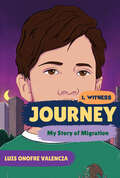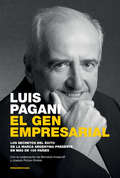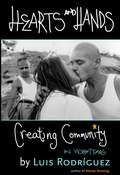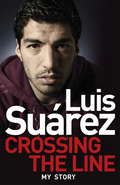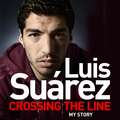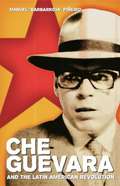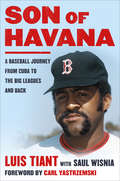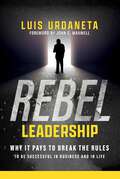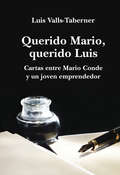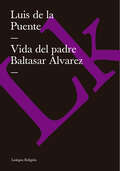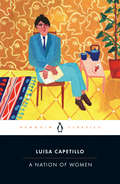- Table View
- List View
Johan Santana (Superstars of Baseball)
by Luis GarcíaJohan Santana is a baseball star from a country better known for its soccer players. But Santana really shines as one of the best pitchers in baseball. His fastballs and changeups keep fans and batters guessing. His talent has made him a fan favorite. Read about how Santana fought his way to the top--from playing ball in the neighborhood to making it in the Big Leagues. His journey to the top hasn't always been smooth, but Johan Santana has fought hard to earn his place in baseball.
Las palabras rotas: El desconsuelo de la democracia
by Luis García MonteroEl nuevo libro de uno de los escritores contemporáneos más reconocidos y queridos por la crítica y los lectores. Verdad, progreso, tiempo, identidad, política, realidad, conciencia, bondad... Son palabras que, en su esencia, nos pertenecen a todos y nos unen por encima de cualquier diferencia. Pero estamos asistiendo a una transformación dirigida de sus significados para conseguir que definan realidades mucho más parciales e interesadas, mucho menos universales. Luis García Montero las recupera aquí, las alisa, les devuelve su sentido original y las rehabilita en su valor integral. La del compromiso cívico es la estirpe a la que, como el Juan de Mairena de Antonio Machado, pertenece este libro en el que brillan las marcas del genio literario del autor: la reflexión, el vitalismo y una prosa que desprende elegancia, calidez, poesía y sensibilidad. «Resulta necesario actuar. El ser humano es racional y tiene costumbres porque es un ser de palabras. A través del lenguaje ha creado su conciencia, su relación con el mundo, su capacidad de imaginar. El lenguaje pasa de las palabras a los hechos. Para empezar a actuar, en nuestra cocina o en la calle, debemos recuperar las palabras rotas por los poderes salvajes. Necesitamos sacar las palabras y su tiempo del cubo de la basura del descrédito para que nuestros actos respondan a ellas y de ellas. Necesitamos unas pocas palabras verdaderas.»Luis García Montero Han dicho sobre el autor y su obra:«Tono sostenido, poderosa nostalgia, emoción delicada que no alza la voz, poesía escueta, ceñida...»Octavio Paz «Parece capaz de contarnos, y de qué manera, lo que habíamos olvidado que sabíamos de nosotros mismos. Luis sirve para hacer afición, para volver a la plaza porque torea José Tomás, para acercarse a las librerías porque ha salido un nuevo libro suyo.»Joaquín Sabina «Es uno de los pocos destinados a la letra grande de la historia de la literatura.»José-Carlos Mainer «Desde que publicó su primer libro, García Montero ha defendido unos objetivos de invariable lucidez y ha logrado que su poesía remita con rigor minucioso a sus ideas estéticas... Y eso lo ha aproximado a lo que suele identificarse con un joven maestro.»José Manuel Caballero Bonald Sobre Alguien dice tu nombre:«Una espléndida novela concebida y escrita con una sencillez machadiana.»Ángel Basanta, El Cultural «[...] Todo contado con gran habilidad, yendo de un plano a otro con tanta pericia que, de pronto, el lector que creía estar en una novela se encuentra, para su sorpresa, que está en otra muy diferente, y lo que en una, en la primera, parecía una cosa, resulta ser otra, otra cosa más, y todo casa, tesela a tesela. El mosaico adquiere así otra apariencia, otro sentido.»Javier Goñi, Babelia «El retrato de esa España concreta y contradictoria en la que sonaba Paul Anka en las radios mientras seguía prestigiándose la mansedumbre al fuego de la cocina familiar. García Montero reconstruye el paisaje íntimo de un país que comenzaba a ser próspero, pero seguía moralmente devastado.»Pablo Martínez Zarracina, El Correo Español
Un lector llamado Federico García Lorca
by Luis García MonteroTodos nosotros somos, en esencia, aquello que leemos. Este principio, difícilmente rebatible desde cualquier rincón de la cultura, es el presupuesto desde el que parte Luis García Montero en este libro que rastrea las huellas que dejaron en Federico García Lorca sus lecturas. Las lecturas a las que Federico García Lorca se acercó en su juventud le convirtieron en la persona que fue -hasta sus últimas consecuencias- y en símbolo de toda una época. Como uno de los escritores españoles más populares del siglo XX, sus obras son objeto continuo de estudio, su poesía resuena más allá de los libros y sus piezas teatrales han conocido multitud de puestas en escena a lo largo de los años. Lejos del mito del autor de genio innato y profundas raíces populares, sus escritos, desde los más tempranos, reflejan un profundo conocimiento de la literatura clásica, de las obras de sus contemporáneos, además de un crecimiento intelectual a la cultura popular, tanto literaria, como musical o teatral. Como todo lector, el joven Lorca buscó en sus lecturas la manera de forjarse una identidad, no solo como escritor, sino también como individuo y como ser social. Este es, sin duda, uno de los más hermosos y fecundos ejercicios de libertad que puede acometer el ser humano. Reseñas:«Es desarmante, como tantas veces en García Montero, la ausencia de petulancia y la simultánea ansiedad por ir desgranando en murmullos, sin levantar la voz, las esquinas de una vida particular a través de objetos y espacios recortables, que sin embargo contienen una mirada irónica y combativa, es decir, inteligente.»Jordi Gracia, Babelia, sobre Una forma de resistencia «[Luis García Montero] es uno de los pocos destinados a la letra grande de la historia de la literatura.»José-Carlos Mainer «Desde que publicó su primer libro, García Montero ha defendido unos objetivos de invariable lucidez y ha logrado que su poesía remita con rigor minucioso a sus ideas estéticas... Y eso lo ha aproximado a lo que suele identificarse con un joven maestro.»José Manuel Caballero Bonald «Excelente lector, buen poeta, interesante novelista, reconocido profesor universitario.»Javier Goñi, Babelia «Luis, como Manrique, como Bécquer, como Rubén, como Machado, como Jaime Gil, como Ángel González, como todos los grandísimos poetas, no solo es un maestro de poetas, que también, sino que, además y sobre todo, parece capaz de contarnos, y de qué manera, lo que habíamos olvidado que sabíamos de nosotros mismos. Luis sirve para hacer afición, para volver a la plaza porque torea José Tomás, para acercarse a las librerías porque ha salido un nuevo libro suyo.»Joaquín Sabina
Eye of the Fish
by Luis H. FranciaThe first of Luis H. Francia's books of non-fiction to be published in the United States, The Eye of the Fish paints a vivid and detailed portrait of the terror, beauty and insistent humanity of the Philippines of today. <p><p> Cross-cutting between Francia's recollections of the Philippines of his youth and accounts of his travels through the archipelago over the past two decades, The Eye of the Fish takes us the length of the nation: from Batanes in the north to the Muslim Jolo and Marawi regions of the south, and from the rugged mountain hideaways of revolutionary freedom fighters to the well-appointed salons of the political and cultural elite. Painters and priests, island shamans and small-town politicians, cultists, feminists and infamous first ladies all make an appearance in this imaginative and idiosyncratic exploration of 'home.' <p> Through their stories, and through his own memories of estrangement and acceptance in the Philippines and in the U.S., Francia reflects on the hybridity that is simultaneously the burden and the benediction of the Philippines--and of his own mestizo self.
Joaquín Suárez: El héroe silencioso
by Luis Hierro LópezUna biografía que nos presenta a un personaje histórico que ha quedado relegado, y cuya personalidad tiene mucho que ver con los cimientos de nuestra identidad como país. De Joaquín Suárez los uruguayos conocemos su abnegación y patriotismo, por aquella vieja frase de que “a la madre no se le llevan cuentas”, cuando se rehusó a recibir la devolución de las enormes sumas de su fortuna personal que había entregado a la Cruzada libertadora de 1825 y al gobierno de la Defensa de Montevideo. Sin embargo, la memoria historiográfica lo tiene un poco olvidado, desdibujándose su enorme figura. Este libro de Luis Hierro López busca suplir esa carencia, con una biografía que nos presenta a un personaje histórico que ha quedado relegado, y cuya personalidad tiene mucho que ver con los cimientos de nuestra identidad como país.
Viva Hollywood: The Legacy of Latin and Hispanic Artists in American Film (Turner Classic Movies)
by Luis I. ReyesThrough an authoritative narrative and lavish photography, this is an in-depth history of the stars, films, achievements, and influence of the Hispanic and Latino community in Hollywood history from the silent era to the present day.Overcoming obstacles of prejudice, ignorance, and stereotyping, this group has given the world some of its most beloved stars and told some of its most indelible stories. Viva Hollywood examines the stars in front of the screen as well as the people behind-the-scenes who have created a rich legacy across more than 100 years.The role of Latin women on screen is explored through the professional lives of Dolores Del Rio, Rita Hayworth, Raquel Welch, Salma Hayek, Penélope Cruz, and many more. The book covers the films and careers of actors ranging from silent screen idol Antonio Moreno, to international Oscar-winning star Anthony Quinn, to Andy Garcia and Antonio Banderas. A spotlight is also given to craftspeople who elevated the medium with their artistry—visionaries like cinematographer John Alonzo, Citizen Kane scenic artist Mario Larrinaga, and Oscar-winning makeup artist Beatrice de Alba.The stories of these and many others begins through a lens of stereotyped on-screen personas of Latin Lovers, sexy spitfires, banditos, and gangsters. World War II saw an embrace of Latin culture as the &“Good Neighbor Policy&” made it both fashionable and patriotic to feature stories set south of the border. Social problem films of the 1950s and '60s brought fresh looks at the community, with performances like Katy Jurado in High Noon, the cast of West Side Story, and racial inequality depicted in George Stevens's Giant. Civil Rights, the Chicano Movement, and the work of activist actors such as Ricardo Montalban and Edward James Olmos influenced further change in Hollywood in subsequent decades and paved the way for modern times and stars the likes of Jennifer Lopez and Lin-Manuel Miranda.Illustrated by more than 200 full-color and black-and-white images, Viva Hollywood is both a sweeping history and a celebration of the legacy of some of the greatest art and artists ever captured on screen.
From Our Land to Our Land: Essays, Journeys, and Imaginings from a Native Xicanx Writer
by Luis J. RodriguezLuis J. Rodriguez writes about race, culture, identity, and belonging and what these all mean and should mean (but often fail to) in the volatile climate of our nation. His passion and wisdom inspire us with the message that we must come together if we are to move forward. As he writes in the preface, &“Like millions of Americans, I&’m demanding a new vision, a qualitatively different direction, for this country. One for the shared well-being of everyone. One with beauty, healing, poetry, imagination, and truth.&” The pieces in From Our Land to Our Land capture that same fantastic energy and wisdom and will spark conversation and inspiration.
Hearts and Hands, Second Edition
by Luis J. RodriguezHearts and Hands focuses on healing through community building. Empowered by thirty years of experience with gangs in Los Angeles and Chicago, Rodri guez offers a unique book of change. He makes concrete suggestions, shows how we can create nonviolent opportunities for youth today, and redirects kids into productive and satisfying lives. And he warns that we sacrifice community values for material gain when we incarcerate or marginalize people already on the edge of society. His drive to dissolve gang influence on kids is as personal as it is societal; his son, to whom he dedicates Hearts and Hands, served more than a decade in prison for gang-related activity. With anecdotes, interviews, and time-tested guidelines, Hearts and Hands makes a powerful argument for building and supporting community life. From the Trade Paperback edition.
It Calls You Back: An Odyssey through Love, Addiction, Revolutions, and Healing
by Luis J. RodriguezIN A HARROWING JOURNEY FROM DRUGGED-OUT GANG MEMBER TO ONE OF THE MOST REVERED FIGURES IN CHICANO LITERATURE AND AMERICAN LETTERS, LUIS J. RODRÍGUEZ CONTINUES THE REMARKABLE STORY OF HIS BESTSELLING MEMOIR, ALWAYS RUNNING. Hundreds of thousands of readers came to know Luis J. Rodríguez through his fearless classic, Always Running, which chronicled his early life as a young Chicano gang member surviving the dangerous streets of East Los Angeles. The longawaited follow-up, It Calls You Back, is the equally harrowing story of Rodríguez starting over, at age eighteen, after leaving gang life--the only life he really knew. It Calls You Back opens with Rodríguez's final stint in jail as a teenager and follows his struggle to kick heroin, renounce his former life, and search for meaningful work. He describes with heartbreaking honesty his challenges as a father and his difficulty leaving his rages and addictions completely behind. Even as he breaks with "la vida loca" and begins to discover success as a writer and an activist, Rodríguez finds that his past--the crimes, the drugs, the things he'd seen and done--has a way of calling him back. When his oldest son is sent to prison for attempted murder, Rodríguez is forced to confront his shortcomings as a father and to acknowledge how and why his own history is repeating itself, right before his eyes. Deeply insightful and beautifully written, It Calls You Back is an odyssey through love, addiction, revolutions, and healing.
Always Running: La Vida Loca, Gang Days in LA
by Luis J. RodríguezAlways Running is the account of Luis J. Rodríguez's growing up in poverty in Los Angeles and his ultimate turning to gang life as a means of preservation. The book chronicles his encounters with racism in school and on the streets, and his struggle to overcome prejudice, drugs, and violence. * * * "And if they murder, it's usually the ones who look like them, the ones closest to who they are--the mirror reflection. They murder and they're killing themselves, over and over." * * * With these words Luis J. Rodríguez expresses the devastation of life in the inner cities. Rodríguez began Always Running when he was 16, finding solace in the words that spilled out of him. However, he was not motivated to complete it until his own son, Ramiro, joined a gang in Chicago, where they now live. Always Running became for Rodríguez a way to offer the kind of mentoring he never received as a youth. It is a tale of survival, presenting a picture of the futility of gang warfare while providing understanding and hope.
Always Running: La Vida Loca: Gang Days in L.A.
by Luis J. RodríguezThe award-winning memoir of life in an LA street gang from the acclaimed Chicano author and former Los Angeles Poet Laureate: &“Fierce, and fearless&” (The New York Times). Luis J. Rodríguez joined his first gang at age eleven. As a teenager, he witnessed the rise of some of the most notorious cliques in Southern California. He grew up knowing only a life of violence—one that revolved around drugs, gang wars, and police brutality. But unlike most of those around him, Rodríguez found a way out when art, writing, and political activism gave him a new path—and an escape from self-destruction. Always Running spares no detail in its vivid, brutally honest portrayal of street life and violence, and it stands as a powerful and unforgettable testimonial of gang life by one of the most acclaimed Chicano writers of his generation. This ebook features an illustrated biography of Luis J. Rodríguez including rare images from the author&’s personal collection.
"The Triple Whammy" and Other Russian Stories: A Memoir
by Luis MenasheAn American historian, film specialist, and documentary filmmaker shares candid stories of his life in Russia during and after the Cold War. A captivating lifetime of personal and professional experiences by an American historian, film specialist, and documentary filmmaker in the Soviet Union and post-Soviet Russia. The author&’s experiences as a radical in the turbulent 1960s, and his eventual disenchantment offer some precedents and perspectives to all those on the Left, Center, or Right interested in the fluctuations of American politics. The vivid log of hopes and disillusions is related in a candid, non-academic style, and set against a panorama of history and politics in the late twentieth century.&“A self-described scholar-activist, Menashe weaves together political, intellectual, and cultural currents of leftist life, and draws a vivid picture of people and places, life-changing adventures, the intellectual and political challenges of graduate school during the Cold War, encounters with key Russian literary and political figures, and much more. Then comes the crash, the Soviet Union&’s end. As in all failed love affairs, Menashe retains some sweet memories. The reader will taste them long after reading the memoir.&” —Carole Turbin, Professor Emerita, History and Sociology, SUNY/Empire State College
The Wolfpack: The Millennial Mobsters Who Brought Chaos and the Cartels to the Canadian Underworld
by Peter Edwards Luis NajeraJoined by award-winning Mexican journalist Luis Nájera, leading organized-crime author Peter Edwards introduces a motley assortment of millennial bikers, gangsters and Mafia whose bloody trail of murders and schemes gone wrong led to the arrival in Canada of the world's most dangerous criminal organizations: the drug cartels of Mexico.A man watching the Euro Cup on a restaurant patio is shot dead on a busy Sunday afternoon in Toronto. Another dies in a sidewalk ambush just outside a bus-tling college campus. Two men in a Vancouver hotel lobby are gunned down in an attack that sends an American soccer star scrambling for cover. In Mexico, a Canadian is killed at a Nuevo Vallarta coffee shop, his death barely registering amidst the terrifying death tolls of President Calderón&’s war on drugs and the cartels&’ response; while a Montreal cop is beaten within an inch of his life in a Playa del Carmen nightclub. An infamous heckler from an NBA Toronto Raptors game turns up dead in a bullet-riddled car in a midtown lane-way. Throughout the 2010s, these and other disparate acts of violence entered the public awareness like iso-lated tragedies—but there was nothing isolated about them.In this masterly investigation, veteran journalists Peter Edwards and Luis Nájera introduce readers to the common cause of a near-decade of chaos. Meet the Wolfpack, millennial-aged gangsters from across the spectrum of Canada&’s underworld. Vying to fast-track their way into the criminal void left by the death of Montreal godfather Vito Rizzuto, the Wolfpack sought advantage in a steady supply of cocaine from El Chapo Guzmán&’s Sinaloa cartel, among the deadliest and most far-reaching of criminal organizations. The juniors had just stepped into the big leagues.This is the roiling landscape of The Wolfpack, a brilliant examination of a time of criminal disruption and rapid adaptation, when one gang&’s unchecked ambition unwittingly gave away the most hotly contested corner of the Canadian underworld without a fight. Brazen criminal disruptors or entitled upstarts looking to get rich without paying their dues--whatever you think of them, you will never forget the Wolfpack.
Journey: My Story of Migration (I, Witness #0)
by Luis Onofre ValenciaA young writer opens a window for young readers on his experiences crossing the US/Mexico border and his life as an undocumented immigrant. When Luis Onofre Valencia was five years old, his father lost his business and was forced to leave Mexico for the United States to find work. Devastated, Luis and his family struggled to keep afloat. When his father asked them to join him in the US, Luis journeyed by truck for several weeks, separate from his family members, who traveled on foot. When the family reunited in Anaheim, Luis faced an entirely new struggle: adapting to a new city and a new culture that did not look kindly on him. With a voice that is both accessible and engaging, Luis brings forward an empowering first-person account of a young man finding strength in his identity, and using this strength to become a community leader, a police intervention activist, and an advocate for mental health.
El gen empresarial: Los secretos del éxito de la marca argentina presente en más de 100 países.
by Luis PaganiEl gen empresarial es un libro clave para entender cómo emprender en la Argentina. A setenta años de la creación de Arcor su presidente, Luis Pagani, cuenta cómo logró convertir el negocio familiar en una empresa líder en Latinoamérica y con una fuerte presencia en el mercado internacional. Con la colaboración de Bernardo Kosacoff y Joaquín Pichón Rivièr. Tras su vasta experiencia, Pagani recorre de forma auténtica los valores que fueron la base de su crecimiento personal, nos cuenta cómo construyó su estilo de liderazgo, cómo afrontó las diferentes crisis del país y cuáles son las claves del éxito de la empresa argentina que más mercados ha abierto en el mundo. A lo largo del libro, el autor destaca el compromiso de todas las personas que forman y formaron parte de Arcor, con quienes comparte la misma vocación por emprender, por asumir desafíos con pasión y compromiso. Este libro mira hacia el futuro sin dejar de resignificar el camino recorrido, y se enfoca en los desafíos y las oportunidades imprescindibles para expandir la industria nacional en los próximos años.
Hearts and Hands: Creating Community in Violent Times
by Luis RodriguezHearts and Hands deals with many of the difficult issues addressed in Luis Rodríguez's memoir of gang life, Always Running, but with a focus on healing through community building. Empowered by his experiences as a peacemaker with gangs in Los Angeles and Chicago, Rodríguez offers a unique book of change. He makes concrete suggestions, shows how we can create nonviolent opportunities for youth today, and redirects kids into productive and satisfying lives. And he warns that we sacrifice community values for material gain when we incarcerate or marginalize people already on the edge of society. His interest in dissolving gang influence on black and latino kids is personal as well as societal; his son, to whom he dedicates Hearts and Hands, is currently serving a prison sentence for gang-related activity. With anecdotes, interviews, and time-tested guidelines, Hearts and Hands makes a powerful argument for building and supporting community life.
Luis Suarez: Crossing the Line - My Story
by Luis SuarezLuis Suárez was a young boy already in love with football by the time his family moved from the countryside to Uruguay's capital, Montevideo. The guile and trickery of the street kid made an impact with the country's biggest club, Nacional, before he was spotted by Dutch scouts who brought him to Europe. <P><P> Suárez was lured from Ajax to Merseyside by another iconic number 7, Kenny Dalglish. From that moment, he terrorised Premier League defences, driving a resurgent Liverpool towards their most exciting top-flight season in 24 years. But there is another side to Luis Suárez: the naturally fiery temperament which drives his competitiveness on the pitch. There was the very public incident with Patrice Evra of bitter rivals Manchester United, and the biting of Chelsea defender Branislav Ivanovic, for which Suárez received eight- and ten-match suspensions respectively. <P>Then during the World Cup finals in Brazil, in a physical encounter against Italy, he bit defender Giorgi Chiellini on the shoulder. Banned from football for four months, derided by the press, he left Brazil in the most testing of circumstances. <P>In the summer's final twist, he became one of the most expensive footballers of all time, moving from Liverpool to Barcelona. <P>In Crossing the Line, Luis Suárez talks from the heart about his intriguing career, his personal journey from scrapping street kid to performer on football's biggest stage, and the never-say-die attitude that sometimes causes him to overstep the mark.
Luis Suarez: Crossing the Line - My Story
by Luis SuarezLuis Suárez was a young boy already in love with football by the time his family moved from the countryside to Uruguay's capital, Montevideo. The guile and trickery of the street kid made an impact with the country's biggest club, Nacional, before he was spotted by Dutch scouts who brought him to Europe.Suárez was lured from Ajax to Merseyside by another iconic number 7, Kenny Dalglish. From that moment, he terrorised Premier League defences, driving a resurgent Liverpool towards their most exciting top-flight season in 24 years.But there is another side to Luis Suárez: the naturally fiery temperament which drives his competitiveness on the pitch. There was the very public incident with Patrice Evra of bitter rivals Manchester United, and the biting of Chelsea defender Branislav Ivanovic.Then during the World Cup finals in Brazil, in a physical encounter against Italy, he bit defender Giorgi Chiellini on the shoulder. Banned from football for four months, derided by the press, he was marched out of the country.In the summer's final twist, he became one of the most expensive footballers of all time, moving from Liverpool to Barcelona. In his first season at the Nou Camp he helped Barca to La Liga and Copa del Rey titles, scoring 16 goals in 27 games.In Crossing the Line, Luis Suárez talks from the heart about his intriguing career, his personal journey from scrapping street kid to performer on football's biggest stage, and the never-say-die attitude that sometimes causes him to overstep the mark.(P)2014 Headline Digital
Luis Suarez: El Pistolero
by Luis SuarezLuis Suárez was a young boy already in love with football by the time his family moved from the countryside to Uruguay's capital, Montevideo. The guile and trickery of the street kid made an impact with the country's biggest club, Nacional, before he was spotted by Dutch scouts who brought him to Europe.Suárez was lured from Ajax to Merseyside by another iconic number 7, Kenny Dalglish. From that moment, he terrorised Premier League defences, driving a resurgent Liverpool towards their most exciting top-flight season in 24 years.But there is another side to Luis Suárez: the naturally fiery temperament which drives his competitiveness on the pitch. There was the very public incident with Patrice Evra of bitter rivals Manchester United, and the biting of Chelsea defender Branislav Ivanovic.Then during the World Cup finals in Brazil, in a physical encounter against Italy, he bit defender Giorgi Chiellini on the shoulder. Banned from football for four months, derided by the press, he was marched out of the country.In the summer's final twist, he became one of the most expensive footballers of all time, moving from Liverpool to Barcelona. In his first season at the Nou Camp he helped Barca to La Liga and Copa del Rey titles, scoring 16 goals in 27 games.In Crossing the Line, Luis Suárez talks from the heart about his intriguing career, his personal journey from scrapping street kid to performer on football's biggest stage, and the never-say-die attitude that sometimes causes him to overstep the mark.
Che Guevara and the Latin American Revolution
by Luis Suárez Manuel Barbarroja PiñeiroManuel Piñeiro, known as "Barbarroja" (Red Beard) was a figure of great mystery for decades, who oversaw Cuba's operations in Latin America and Africa and in this work closely collaborated with Che Guevara. Pineiro first spoke out publicly only in 1997, but died in a car crash shortly afterwards. Pineiro offers some fascinating insights into Che's Latin American strategy and answers the accusation that Che left Cuba because he was disaffected and that Fidel Castro abandoned him when the Bolivia mission began to fail.
Son of Havana: A Baseball Journey from Cuba to the Big Leagues and Back
by Luis Tiant Saul WisniaA memoir by the mustachioed baseball pitcher who went playing rocky, trash-ridden fields in Castro&’s Cuba to becoming a Boston Red Sox legend. Luis Tiant is one of the most charismatic and accomplished players in Boston Red Sox and Major League Baseball history. With a barrel-chested physique and a Fu Manchu mustache, Tiant may not have looked like the lean, sculpted aces he usually played against, but nobody was a tougher competitor on the diamond, and few were as successful. There may be no more qualified twentieth-century pitcher not yet enshrined in the National Baseball Hall of Fame. His big-league dreams came at a price: racism in the Deep South and the Boston suburbs, and nearly fifteen years separated from a family held captive in Castro&’s Cuba. But baseball also delivered World Series stardom and a heroic return to his island home after close to a half-century of forced exile. The man whose name—&“El Tiante&” —became a Fenway Park battle cry has never fully shared his tale in his own words, until now. In Son of Havana, Tiant puts his heart on his sleeve and describes his road from torn-up fields in Havana to the pristine lawns of major league ballparks. Readers will share Tiant&’s pride when appeals by a pair of US senators to baseball-fanatic Castro secure freedom for Luis&’s parents to fly to Boston and witness the 1975 World Series glory of their child. And readers will join the big-league ballplayers for their spring 2016 exhibition game in Havana, when Tiant—a living link to the earliest, scariest days of the Castro regime—threw out the first pitch.
Rebel Leadership: Why It Pays to Break the Rules to Be Successful in Business and Life
by Luis UrdanetaA rags to riches story about a young Venezuelan boy who chased his dreams and rose to success, founding a near billion-dollar company.Having grown up poor in Venezuela and without a high school diploma, Luis Urdaneta&’s future did not look big or bright. Yet, a rebel since childhood, he did not let his circumstances define him and decided he would change his life for the better. He received his first taste of success as a direct salesperson for Tupperware, where he met mentors who taught him what it took to make it to the top. That, combined with his belief in himself, helped him achieve great success. Then at only thirty-nine, he lost everything when he turned away from direct sales—his true passion. However, he reset his focus, returning to direct sales and launching his own direct sales company in Venezuela. He soon realized he needed to push for new levels, so surrounded with trusted teammates and family, he began chasing the American Dream. The MONAT brand was introduced to market, selling high-end beauty products, and has since become a near-billion-dollar company. In Rebel Leadership, Urdaneta shares the key character traits required to achieve your dreams and goals. You&’ll learn how he developed his rebel leadership style and why he believes that, just like him, you can become successful by dreaming big. Hint: it takes a lot of hard work, discipline, and never giving up. You&’ll be inspired by his rags to riches story and learn what makes a true rebel leader in life and in business. As Luis says, &“If you behave like a leader, act every day with faith, believe in yourself, and have a clear true north, you will achieve success.&”
Querido Mario, querido Luis: Cartas entre Mario Conde y un joven emprendedor
by Luis Valls-TabernerEl intercambio epistolar entre Mario Conde, un hombre que llegó a la cumbre y después bajó a los infiernos y el joven Luis Valls-Taberner, que encontrará en él a un mentor. Querido Mario,Estoy en un momento en el que no sé exactamente lo que quiero hacer con mi vida. Pero sí tengo cada vez más claro lo que no quiero hacer. Ya sabes que me gustaría demostrarme y demostrarte que han sido bien invertidos tus consejos.Luis Querido Luis,Si quieres ser empresario, adelante. Si quieres ser funcionario, adelante. Si tienes vocación de una cosa u otra, adelante. Pero situando lo instrumental en su propio plano. Un empresario de gigantesco éxito en lo material puede ser un hombre fracasado en su dimensión vital. De hecho, este escenario se da con mucha, con demasiada frecuencia. Te dije que en mi vida pasada siempre sostuve que un hombre no son sus cosas, sean la abogacía del Estado, el despacho de abogados, la industria farmacéutica o Banesto; también son cosas la cárcel y los juicios, las condenas y las absoluciones. Así que las cosas se guardan en alacenas, pero no se vive con ellas, no se duerme con ellas, ni se vive para ellas.Mario
Vida del padre Baltasar Álvarez
by Luis de la PuenteThis thoughtful biography employs a unique style and focuses on the Christian asceticism and martyrdom of Father Batasar Álvarez. It is of immense importance to anyone interested in the study of spirituality and religious history. Written during a time of great expansion for the Society of Jesus, Linkgua recently recovered this text and offered it based on an incredible mondern demand.
A Nation of Women: An Early Feminist Speaks Out (Recovering The U. S. Hispanic Literary Heritage)
by Luisa CapetilloThe groundbreaking feminist and socialist writings of Puerto Rican author and activist Luisa Capetillo. <p><p> In 1915, Puerto Rican activist Luisa Capetillo was arrested and acquitted for being the first woman to wear men's trousers publicly. While this act of gender-nonconforming rebellion elevated her to feminist icon status in modern pop culture, it also overshadowed the significant contributions she made to the women's movement and anarchist labor movements of the early twentieth century--both in her native Puerto Rico and in the migrant labor belt in the eastern United States. With the volume A Nation of Women, Capetillo's socialist and feminist activism is given the spotlight it deserves with its inclusion of the first English translation of Capetillo's landmark Mi opinión sobre las libertades, derechos y deberes de la mujer. <p><p> Originally published in Spanish in 1911, Mi opinión is considered by many to be the first feminist treatise in Puerto Rico and one of the first in Latin America and the Caribbean. In concise prose, Capetillo advocates a workers' revolution, forcefully demanding an end to the exploitation and subordination of workers and women. Her essays challenge big business in favor of socialism, call for legalizing divorce and the acceptance of "free love" in relationships, and cover topics such as sexuality, mental and physical health, hygiene, spirituality, and nutrition. At once a sharp critique and a celebration of the gathering fervor of world politics, A Nation of Women embraces the humanistic thinking of the early twentieth century and envisions a world in which economic and social structures can be broken down, allowing both the worker and the woman to be free.
